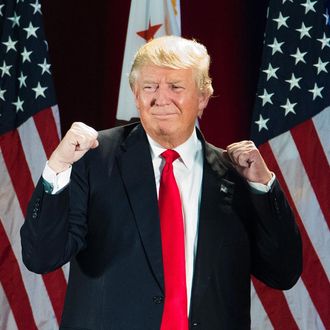
When the Republican Establishment began rallying behind Donald Trump last month, they knew they were about to nominate a race-baiting con man. But they assumed he was at least a politically competent race-baiting con man.
And they had a fairly sound basis for that assumption. Trump may have behaved like an unhinged, authoritarian insult comic during the Republican primary, but that was, apparently, the politically savvy way for a GOP candidate in 2016 to comport himself. And considering how thoroughly the mogul had rebranded for the GOP race, it was possible to imagine that Trump’s bizarre persona and unconventional campaign were the products of incisive political calculation.
After all, Trump was a former Clinton donor, who once supported single-payer health care, President Obama, abortion rights, and the largest tax increase in American history. So the mogul wasn’t just the right demagogue, in the right party, at the right time: He was a shrewd operator who had identified the true passions of the GOP base and carefully crafted a political persona — over a period of several years — that spoke directly to those anxieties and aspirations. Beginning with the birther movement, continuing with his outspoken opposition to immigration reform and political correctness, and culminating in his proudly xenophobic primary campaign, Trump had expertly marketed himself for the audience he needed to win.
Surely, a politician with so few ideological commitments — and so much thirst for power — would gladly reorient his persona and political operation to the unique demands of a general-election campaign.
The last five weeks have not been kind to that reasoning. Not only has Trump declined to smooth out the sharper edges of his primary persona — he appears literally unable to comprehend that the dynamics of a general-election campaign differ in any way from those of a Republican primary.
In recent days, Trump has reneged on his pledge to raise $1 billion for his general-election campaign, reasoning that the “generate constant free media through offensive gaffes” strategy that carried him through the primary will serve him just as well in the general.
“I just don’t think I need nearly as much money as other people need because I get so much publicity,” the mogul explained to Bloomberg.
Nor does the GOP nominee see any need to build out a national campaign headquarters, establish a data-driven voter-targeting operation, or expand a campaign staff that currently employs 70 people — 662 fewer than the Clinton campaign has on its payroll.
Trump’s resistance to the notion that his campaign needs additional staff was well captured in an anecdote published by The Hill on Friday:
A well-meaning adviser to Donald Trump recently told the presumptive Republican presidential nominee that he needed to bulk up his campaign staff to get his message out faster.
Trump was told to hire a rapid response person to deal with negative stories in the press.
“I am the rapid response person,” Trump shot back.
Later in the same piece, campaign sources tell the news site that the GOP nominee “sees no reason why he should change the formula that has got him this far.”
Sources who spoke to the Washington Post reported the same phenomenon.
The candidate scrutinizes proposed budgets, sending them back with skeptical queries, according to people familiar with the discussions. His main argument: I only spent $56 million in the primary and I beat 16 opponents — why do I need all this?
Among the many obvious reasons why Trump needs to change his formula:
1. The way he conducted his primary campaign drastically increased his unfavorability rating with the broader American electorate.
2. His general-election opponent has more money, resources, and staff at her disposal than any of his primary rivals ever did.
But Trump appears to be unable to make an even more basic distinction between the two phases of the presidential contest: An individual state’s GOP primary electorate — and its general-election electorate — aren’t the same. Thus, just because a Republican candidate wins a state’s primary by a large margin doesn’t mean that he or she will be competitive in that state in November.
When Trump met with his finance team this week, he told them he planned to invest time and money into California, Maryland, and New York — states where Obama won 59, 62, and 63 percent of the vote, respectively.
Let’s dispense with this fiction that Donald Trump knows what he’s doing.






























